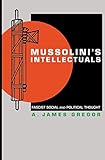Mussolini's Intellectuals : Fascist Social and Political Thought / A. James Gregor.
Material type: TextPublisher: Princeton, NJ : Princeton University Press, [2009]Copyright date: ©2004Edition: Course BookDescription: 1 online resource (280 p.)Content type:
TextPublisher: Princeton, NJ : Princeton University Press, [2009]Copyright date: ©2004Edition: Course BookDescription: 1 online resource (280 p.)Content type: - 9780691127903
- 9781400826346
- DG571.G74 2005
- online - DeGruyter
- Issued also in print.
| Item type | Current library | Call number | URL | Status | Notes | Barcode | |
|---|---|---|---|---|---|---|---|
 eBook
eBook
|
Biblioteca "Angelicum" Pont. Univ. S.Tommaso d'Aquino Nuvola online | online - DeGruyter (Browse shelf(Opens below)) | Online access | Not for loan (Accesso limitato) | Accesso per gli utenti autorizzati / Access for authorized users | (dgr)9781400826346 |
Frontmatter -- Contents -- Preface -- Acknowledgments -- Chapter 1. Some Issues in the Intellectual History of Fascism -- Chapter 2. The Historic Background and Enrico Corradini -- Chapter 3. Alfredo Rocco and the Elements of Fascist Doctrine -- Chapter 4. Sergio Panunzio: From Revolutionary to National Syndicalism -- Chapter 5. Idealism, Ugo Spirito, and the Outlines of Fascist Doctrine -- Chapter 6. Ugo Spirito and the Rationale of the Corporative State -- Chapter 7. Sergio Panunzio and the Maturing of Fascist Doctrine -- Chapter 8. Camillo Pellizzi, Carlo Costamagna, and the Final Issues -- Chapter 9. Doctrinal Interlude: The Initiatic Racism of Julius Evola -- Chapter 10. Doctrinal Continuity and the Fascist Social Republic -- Chapter 11. Conclusions -- Index
restricted access online access with authorization star
http://purl.org/coar/access_right/c_16ec
Fascism has traditionally been characterized as irrational and anti-intellectual, finding expression exclusively as a cluster of myths, emotions, instincts, and hatreds. This intellectual history of Italian Fascism--the product of four decades of work by one of the leading experts on the subject in the English-speaking world--provides an alternative account. A. James Gregor argues that Italian Fascism may have been a flawed system of belief, but it was neither more nor less irrational than other revolutionary ideologies of the twentieth century. Gregor makes this case by presenting for the first time a chronological account of the major intellectual figures of Italian Fascism, tracing how the movement's ideas evolved in response to social and political developments inside and outside of Italy. Gregor follows Fascist thought from its beginnings in socialist ideology about the time of the First World War--when Mussolini himself was a leader of revolutionary socialism--through its evolution into a separate body of thought and to its destruction in the Second World War. Along the way, Gregor offers extended accounts of some of Italian Fascism's major thinkers, including Sergio Panunzio and Ugo Spirito, Alfredo Rocco (Mussolini's Minister of Justice), and Julius Evola, a bizarre and sinister figure who has inspired much contemporary "neofascism." Gregor's account reveals the flaws and tensions that dogged Fascist thought from the beginning, but shows that if we want to come to grips with one of the most important political movements of the twentieth century, we nevertheless need to understand that Fascism had serious intellectual as well as visceral roots.
Issued also in print.
Mode of access: Internet via World Wide Web.
In English.
Description based on online resource; title from PDF title page (publisher's Web site, viewed 30. Aug 2021)


